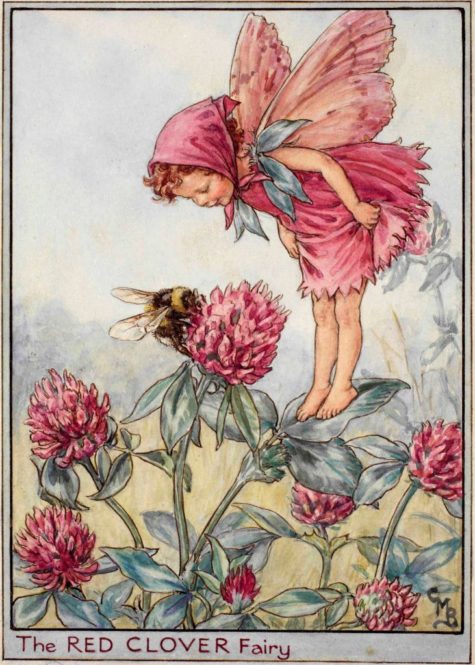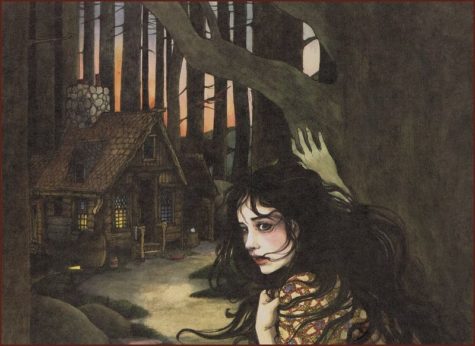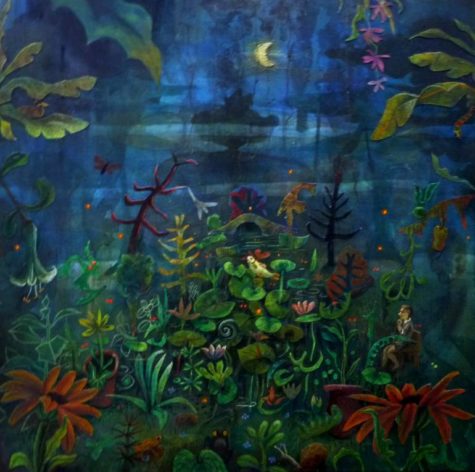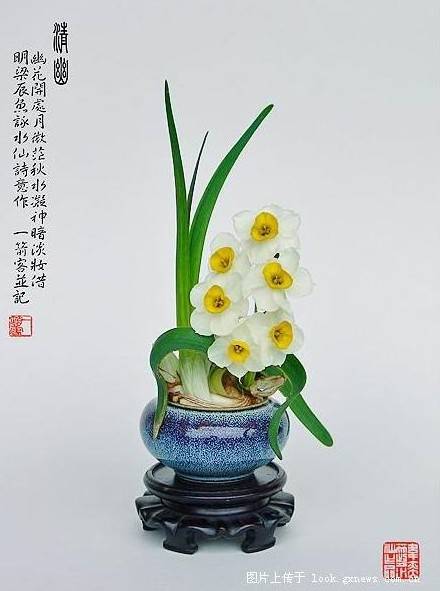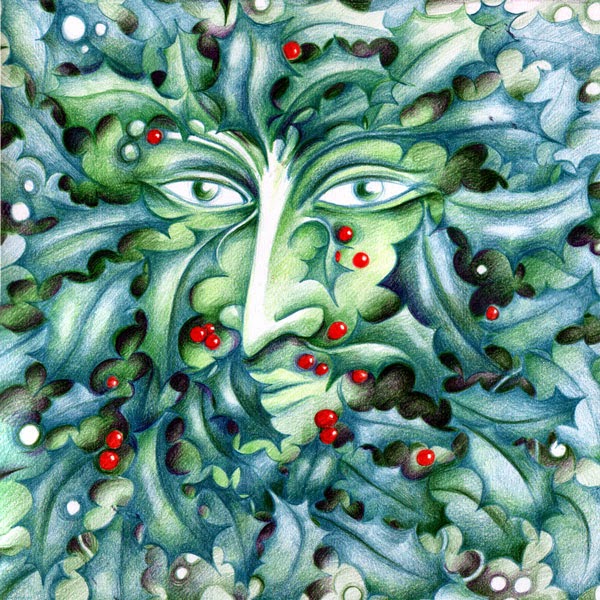Flowers
The Red Clover Fairy
White Clover Fairy
The Lycanthropous Flower
From the book Werwolves, by Elliott O’Donnell, first published in 1912, we have this account of the case of the family of Kloska and the Lycanthropous flower.
In the mountainous regions of Austria-Hungary and the Balkan Peninsula are certain flowers credited with the property of converting into werewolves whoever plucks and wears them. Needless to say, these flowers are very rare, but I have heard of their having been found, comparatively recently, both in the Transylvanian Alps and the Balkans.
A story a propos of one of these discoveries was told me last summer.
Ivan and Olga were the children of Otto and Vera Kloska – the former a storekeeper of Kerovitch, a village on the Roumanian side of the Transylvanian Alps. One morning they were out with their mother, watching her wash clothes in a brook at the back of their house, when, getting tired of their occupation, they wandered into a thicket.
“Let’s make a chaplet of flowers,” Olga said, plucking a daisy. “You gather the flowers and I’ll weave them together.”
“It’s not much of a game,” Ivan grumbled, “but I can’t think of anything more exciting just now, so I’ll play it. But let’s both make wreaths and see which makes the best.”
To this Olga agreed, and they were soon busily hunting amidst the grass and undergrowth, and scrambling into all sorts of possible and impossible places.
Presently Ivan heard a scream, followed by a heavy thud, and running in the direction of the noise, narrowly avoided falling into a pit, the sides of which were partly overgrown with weeds and brambles.
“It’s all right,” Olga shouted; “I’m not hurt. I landed on soft ground. It’s not very deep, and there’s such a queer flower here – I don’t know what it is; I’ve never seen one like it before.”
Ivan’s curiosity thus aroused, he carefully examined the sides of the pit, and, selecting the shallowest spot, lowered himself slowly over and then dropped. It was nothing of a distance, seven or eight feet at the most, and he alighted without mishap on a clump of rank, luxuriant grass. “See! here it is,” his sister cried, pointing to a large, very vivid white flower, shaped something like a sunflower, but soft and pulpy, and full of a sweet, nauseating odour. “It’s too big to put in a wreath, so I’ll wear it in my buttonhole.”
“Better not,” Ivan said, snatching it from her; “I don’t like it. It’s a nasty-looking thing. I believe it’s a sort of fungus.”
Olga then began to cry, and as Ivan was desirous of keeping the peace, he gave her back the flower. She was a prepossessing child, with black hair and large dark eyes, pretty teeth and plump, sunburnt cheeks. Nor was she altogether unaware of her attractions, for even at so early an age she had a goodly share of the inordinate vanity common to her sex, and liked nothing better than appearing out-of-doors in a new frock plentifully besprinkled with rosettes and ribbons.
The flower, she told herself, would look well on her scarlet bodice, and would be a good set-off to her black hair and olive complexion. All this was, of course, beyond the comprehension of Ivan, who regarded his sister’s weakness with the most supreme contempt, and for his own part was never so happy as when skylarking with other boys and getting into every conceivable kind of mischief. Yet for all that he was in the main sensible, almost beyond his years, and extremely fond, and – though he would not admit it – proud of Olga.
She fixed the flower in her dress, and imitating to the best of her knowledge the carriage of royalty, strutted up and down, saying “Am I not grand? Don’t I look nice? Ivan – salute me!”
And Ivan was preparing to salute her in the proper military style, taught him by a great friend of his in the village, a soldier in the carabineers for whom he had an intense admiration, when his jaw suddenly fell and his eyes bulged.
“Whatever is the matter with you?” Olga asked.
“There’s nothing the matter with me,” Ivan cried, shrinking away from her; “but there is with you. Don’t! don’t make such faces – they frighten me,” and turning round, he ran to the place where he had made his descent and tried to climb up.
Some minutes later the mother of the children, hearing piercing shrieks for help, flew to the pit, and, missing her footing, slipped over the brink, and falling some ten or more feet, broke one of her legs and otherwise bruised herself.
For some seconds she was unconscious, and the first sight that met her eyes on coming to was Ivan kneeling on the ground, feebly endeavoring to hold at bay a gaunt grey wolf that had already bitten him about the legs and thigh, and was now trying hard to fix its wicked white fangs into his throat.
“Help me, mother!” Ivan gasped; “I’m getting exhausted. It’s Olga.”
“Olga!” the mother screamed, making frantic efforts to come to his assistance. “Olga! what do you mean?”
“It’s all owing to a flower – a white flower,” Ivan panted; “Olga would pluck it, and no sooner had she fixed it on her dress than she turned into a wolf! Quick, quick! I can’t hold it off any longer.”
Thus adjured the wretched woman made a terrific effort to rise, and failing in this, clenched her teeth, and, lying down, rolled over and over till she arrived at the spot where the struggle was taking place. By this time, however, the wolf had broken through Ivan’s guard, and he was now on his back with his right arm in the grip of his ferocious enemy.
The mother had not a knife, but she had a long steel skewer she used for sticking into a tree as a means of fastening one end of her washing line. She wore it hanging to her girdle, and it was quite by a miracle it had not run into her when she fell.
“Take care, mother,” Ivan cried, as she raised it ready to strike; “remember, it is Olga.”
This indeed was an ugly fact that the woman in her anxiety to save the boy had forgotten. What should she do? To merely wound the animal would be to make it ten times more savage, in which case it would almost inevitably destroy them both. To kill it would mean killing Olga. Which did she love the most, the boy or the girl?
Never was a mother placed in such a dilemma. And she had no time to deliberate, not even a second. God help her, she chose. And like ninety-nine out of a hundred mothers would have done, she chose the boy; he – he at all costs must be saved. She struck, struck with all the pent-up energy of despair, and in her blind, mad zeal she struck again.
The first blow, penetrating the werewolf’s eye, sank deep into its brain, but the second blow missed – missed, and falling aslant, alighted on the form beneath.
An hour later a villager on his way home, hearing extraordinary sounds of mirth, went to the side of the pit and peeped over.
“Vera Kloska!” he screamed; “Heaven have mercy on us, what have you there?”
“He! he! he!” came the answer. “He! he! he! My children! Don’t they look funny? Olga has such a pretty white flower in her buttonhole, and Ivan a red stain on his forehead. They are deaf – they won’t reply when I speak to them. See if you can make them hear.”
But the villager shook his head. “They’ll never hear again in this world, mad soul,” he muttered. “You’ve murdered them.”
Spring Night
Ode To Lakshmi
Incantation To Plants
The following is an “Incantation To Plants,” written by the Greek physicians of Alexandria (which explains both the usage of Greek and Egyptian gods), which would be used while watering or collecting plants.
You were sown by Cronos
Made welcome by Hera,
Protected by Ammon,
Born of Isis,
Nourished by Zeus of the Rains.
You have grown by favor of the Sun
and of the dew.
You are the dew of all the gods,
The heart of Hermes,
The seed of the high gods,
The eye of the Sun,
The light of the Moon,
The dignity of Osiris,
The beauty and the glory of the sky,
The soul of the Daimon of Osiris, who feasts in all places,
The breath of Ammon.
Rise up, as you caused Osiris to rise up;
Lift yourself up like the Sun.
You are as tall as the zenith;
Your roots are deep also as the abyss.
Your virtues are in the heart of Hermes;
Your branches are the bones of Mnevis
Your flower, the eye of Horus,
Your seeds, the seed of Pan.
I purify you with resin even as the gods,
For my good health;
Be purified also by my prayer and be powerful,
For our sake, as Ares or Athene.
I am Hermes.
I pick (water, tend) you with good luck, and with the Good Daimon,
And at the propitious hour,
On the day which is right and propitious for all things.
Found in: The Mysteries of Isis
Meadow Queen Fairy Song
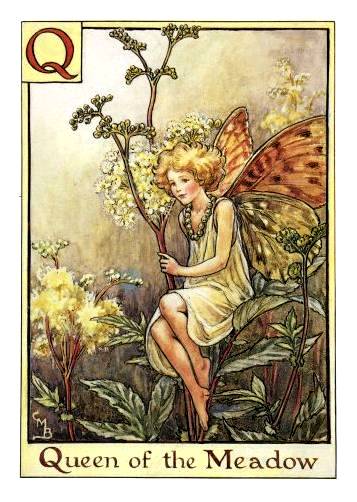 The Song of The
The Song of The
Queen Of The Meadow Fairy
Queen of the Meadow
where small streams are flowing,
What is your kingdom
and whom do you rule?
“Mine are the places
where wet grass is growing,
Mine are the people
of marshland and pool.
“Kingfisher-courtiers,
swift-flashing, beautiful,
Dragon-flies, minnows,
are mine one and all;
Little frog-servants who
wait round me, dutiful,
Hop on my errands
and come when I call.”
Gentle Queen Meadowsweet,
served with such loyalty,
Have you no crown to wear?
“Nothing I need
for a sign of my royalty,
Nothing at all
But my own fluffy hair!”
Story of the Sacred Lily
The “sacred lily” (Narcissus) that blooms at the Chinese New Year is the emblem of happiness, and whoever finds his lily blooming exactly on that day, is sure to be lucky. There is a legend connected with it that is more than a thousand years old.
Once there lived in China two orphan brothers. The eldest inherited the largest share of the ancestors’ estates and also wickedly seized the younger brother’s inheritance, leaving him only a few acres of rough, pebbly soil upon which nothing would grow. At one end of the ground was a marsh overgrown with rank weeds and rushes. For years the younger brother bore with magnanimous patience the rapacity of the eldest. Poverty and hunger at last broke him down. Overcome by despair he lay on the ground, sobbing and bemoaning his fate.
Suddenly he was aroused by a sweet voice calling his name. He looked up and beheld a beautiful fairy standing over him and bidding him rise, saying:
“Thy patience and forbearance have been seen by the gods and now there is a rich reward in store for thee. Lo! Where thy head has rested thou shalt find it beneath the soil. To reach it will be no easy task, but patient toil shall bring thee thy reward. Take courage then. Rest not till thou hast found, buried deep, that which shall give thee immortal fame, and make thee beloved and honored for a thousand generations.”
The fairy vanished, the rocky ground was still there, but hope possessed the young man’s soul. For many a day he dug and toiled. At last he found the promised treasure. It was nothing but a lily-bulb. With faith in the fairy’s promise he took it up, planted it, and nourished it until it grew into a flower, fairer than any that had ever been seen. Riches and honors came to him from the moment it began to bloom. Other bulbs sprang from its roots. His name and his story soon became famous.
Strange as it may seem, the lily would grow in no other part of China. Thousands came to him to buy this flower of wealth which has ever since borne the name of the Shuey Seen Fah, the flower of the water-fairy, and which has become the emblem of a happy New Year. To this day the only way to cultivate it, is on stones and rocks covered with water, in remembrance of its original rough and stony ground.
From: Encyclopaedia of Superstitions, Folklore and The Occult Sciences
James Cheney: Invocation To The Dark Mother
Daniel: Prayer Before The Final Battle
blessed obyno: Queen of Ghosts
blessed obyno: Queen of Ghosts
Caerlion Arthur: The Great, Bloody and Bruised Veil of the World
